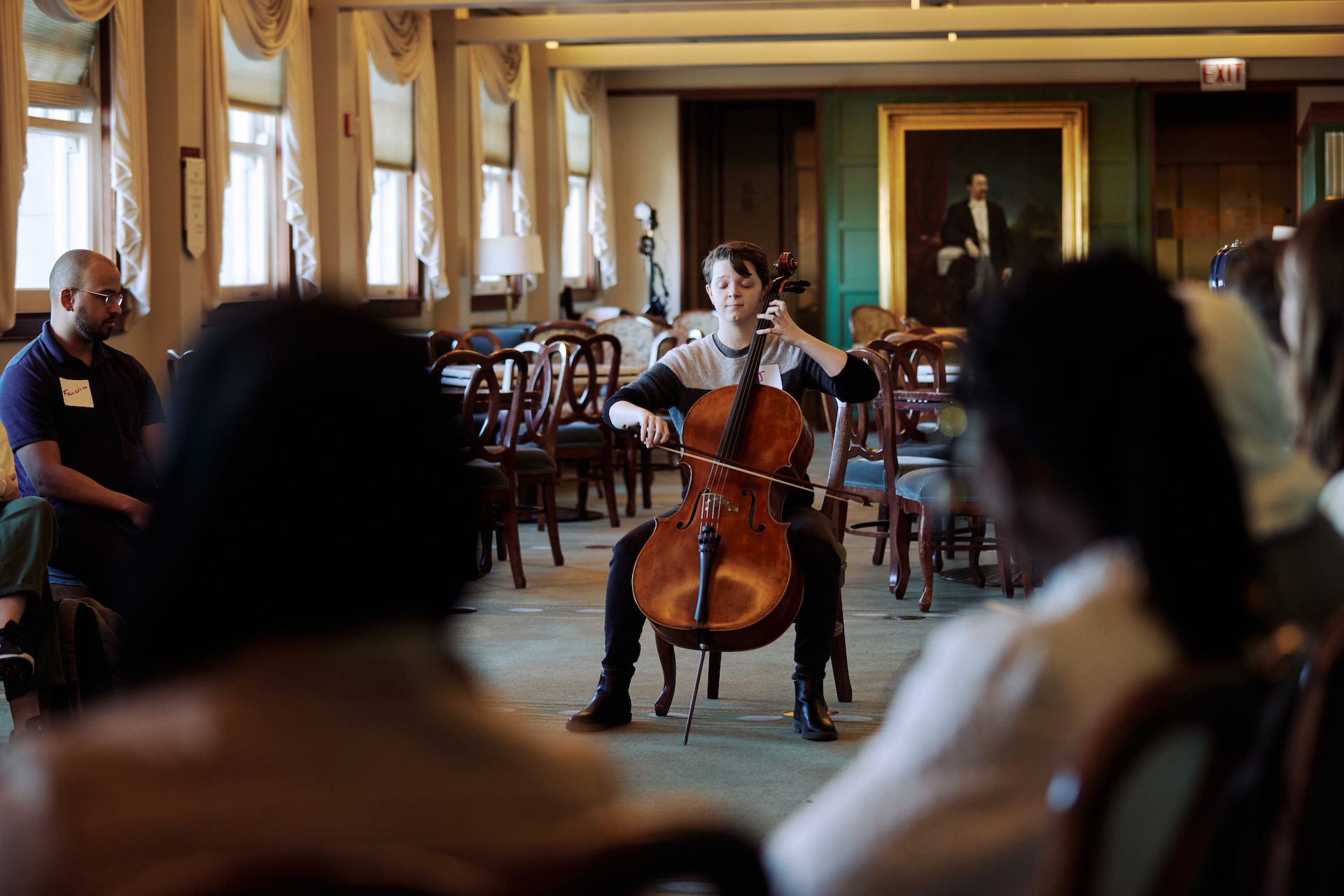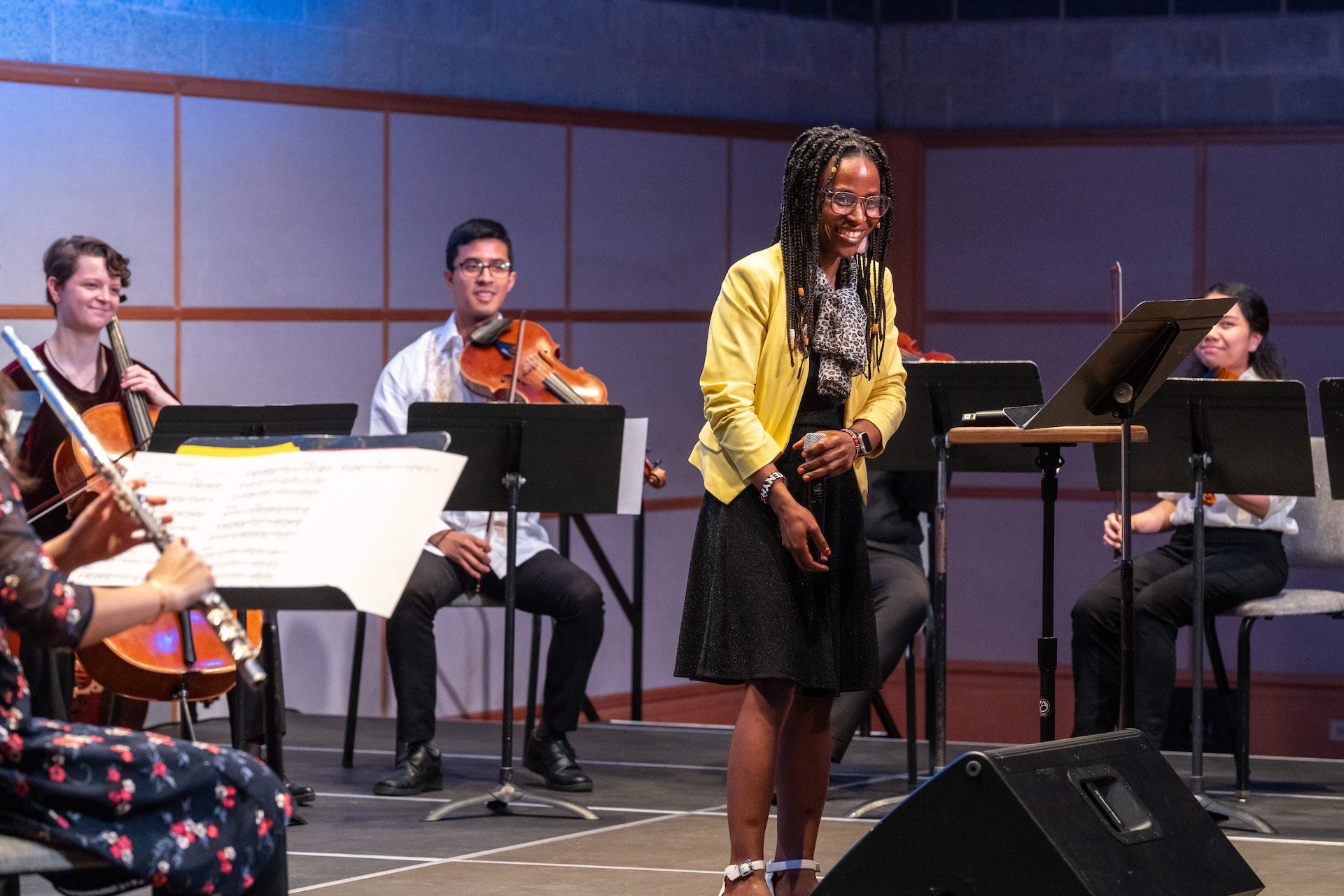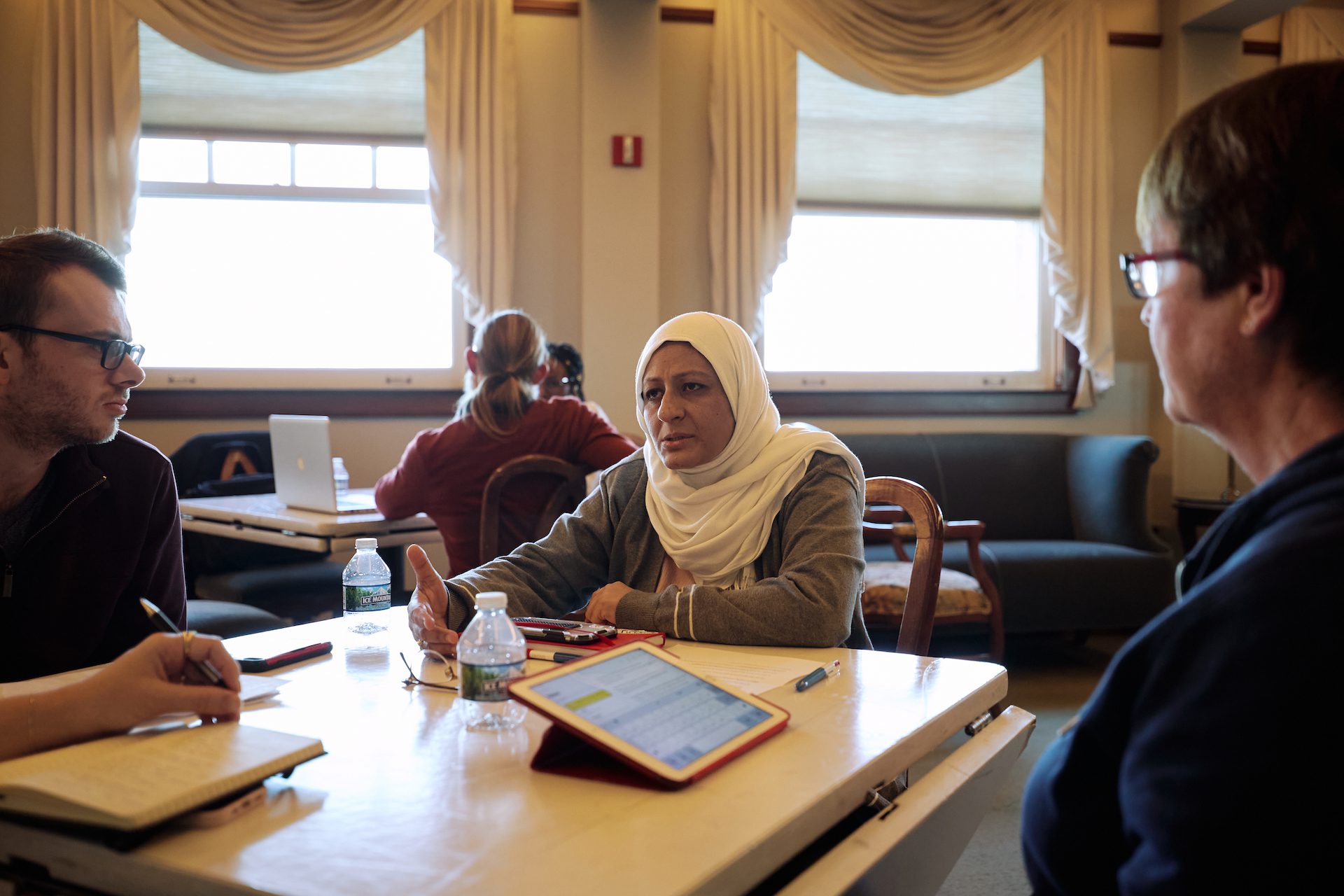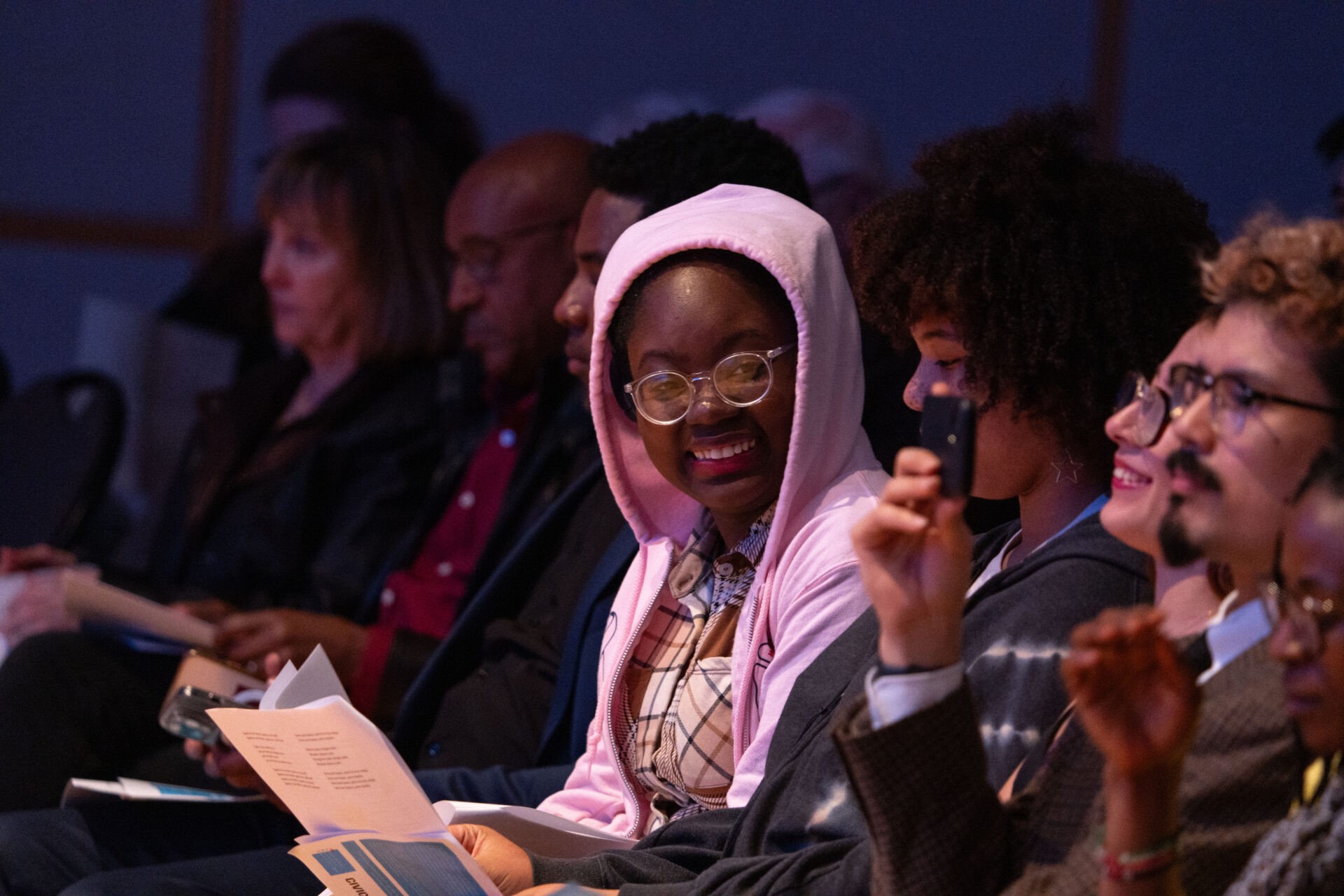 Mustafa Hussain for Borderless Magazine
Mustafa Hussain for Borderless MagazineFor one night, the Chicago Symphony Orchestra and the Chicago Refugee Coalition turned inspirational immigrant stories into a musical journey to bring awareness of the current migrant crisis.
Faiza Haider grew up in Kenya.
One of her fondest childhood memories was her nighttime drives, listening to Bollywood music with her father in the undeveloped areas outside of town. “We would go for a drive, and dad would play his old music in the car, and in the moonlight, you could see beautiful, shining, shimmering eyes of the wildlife,” Haider remembered.
Haider now lives in Chicago and has grown children of her own, but her heart is still in Kenya. “When I hear a song of that type, it takes me right back to that memory.
For Haider, music can bridge the gap between different backgrounds and create universal joy. That’s one of the reasons she was eager to be a part of the Chicago Symphony Orchestra’s collaboration with the Chicago Refugee Coalition last month. The partnership brought together musicians and refugees to create music and elevate their immigrant stories for a one-night performance.
Want to receive stories like this in your inbox every week?
Sign up for our free newsletter.

On a sunny Saturday afternoon in downtown Chicago, civic fellows from the Chicago Symphony Orchestra and members of the music nonprofit Irene Taylor Trust met with members of the Chicago Refugee Coalition in an ornate room in the Symphony Center.
The coalition members shared details of how music has influenced them and how their backgrounds shaped the people they are today. They discussed songs that impacted them, music they heard in adolescence, musical traditions and their backgrounds with instruments or singing. The fellows then created pieces to represent each individual and performed them two weeks later.
“Music is the conduit for trust,” said Sara Lee, the co-founder and artistic director of the Irene Taylor Trust. The organization was founded in 1995 and aims to use music as a form of rehabilitation. Members of the group work with traditionally disadvantaged and marginalized groups and record music based on their background as a way to transcend their negative experiences.
Read More of Our Coverage
Lee, along with other members of the Irene Taylor Trust, has been working with the Chicago Symphony Orchestra since 2018 on a project called Notes for Peace, where families of gun violence victims compose, record and perform original songs of tribute in collaboration with the civic fellows.
The group recently looked for ways to address the recent influx of migrants with the same assistance and support, which led to a partnership between the symphony and the Chicago Refugee Coalition.
The performance featured refugees from all over the world. Each of the seven pieces performed was as unique and special as the individual it represented. Some contained spoken word, some featured poems and one highlighted a refugee named Ruth Mwamikazi belting the words to Sema Nami, a song by Seema Cizungu. All the while, the fellows skillfully played music from each individual’s homeland — from the Congo to Somalia to Venezuela.
“It’s just become this beautiful collaboration,” said Alisa Roadcup Bhachu, the Chicago Refugee Coalition executive director. “It’s something that hasn’t really ever been done before, which is why we’re really honored to partner with the symphony on it.”

“I would never be able to separate myself from Kenya.”
Throughout Haider’s upbringing, she traveled often. Each place she visited, along with her Pakistani culture, gave her a strong appreciation for different types of music and the variety of ways people use it to express themselves.
She recalled songs she’d heard at funerals and weddings, her grandfather’s Bollywood music playing through his record player, the hypnotic sound of the didgeridoo in Malaysia, the groups who danced around djembes in Kenya, and the sword dances she saw in Saudi Arabia.
Her travels shaped her musical tastes and her lease on life, allowing her to connect with all types of people. Haider’s time in Chicago has only enriched her perspective on the importance of recognizing and understanding differences in cultural backgrounds.
“I love how this [collaboration] supports everyone’s stories, everyone’s backgrounds, everyone’s journeys,” said Haider. “I’ve come across so many people that end up here in Chicago and they all have such different stories. From the grace of God, I’ve come here from a much more comfortable position [than many other immigrants], but everything is still strange in a new country because I’ve left my whole life behind.”

And while Haider said that moving to the U.S. was a good change, and she no longer has an anchor in Kenya, her heart will always be there. “I would never be able to separate myself from Kenya,” she said.
This was emphasized during Haider’s portion of the performance. While the symphony played instruments and music that reflected Haider’s travels throughout her life, they began and ended with music representative of her heart and home — the National Anthem of Kenya and Jambo Bwana.
Jambo Bwana is a song, Haider said, that is played all the time in Kenya as a welcome to tourists. One of the lines is: “Nichi yenye amani, Hakuna Matata,” which translates to “All are welcome, there are no problems.” Now, her son will put it on anytime she’s feeling sad to cheer her up and remind her of home.
Haider’s children know more about her through their exposure to her musical background, and she said it’s a “connecting string” that links her past with their present and helps enrich their lives.
Music Spanning Generations
Faidat Abass, a 17-year-old girl from Nigeria, was another participant in the collaboration. She attends Sullivan High School in Rogers Park, where CRC operates a resource center.
Affectionately known as “Refugee High,” about half of Sullivan’s student body are refugees, one of the highest percentages in public school enrollment nationally. Nearly 40 languages are spoken at the Chicago Public School, and Abass, who is fluent in French and English, finds comfort in the sprawling campus’ diverse and welcoming atmosphere.
Abass, who plays the baritone, sees music as a universal language and a form of storytelling that connects people through their shared feelings and experiences. Her section of the performance included a poem called “Toju iwa re ore mi,” or “Enhance your character, my friend,” read in Yoruba, a language that reminds her of her grandmother. The poem was followed by the symphony’s rendition of the Nigerian pop ballad “Poverty Die,” complete with several tuba solos to acknowledge Abass’ baritone skills.
Following the concert, Abass was in tears. “I loved it,” she said. “I’m so happy.”

Haider was also thrilled to be a part of the performance and the hope, she said, it will provide to Chicago’s newest members.
“If you can reach people’s hearts through music, I think that’s wonderful,” said Haider. “This is giving them the hope that, through music, there is a future.”
She also wants events like this to bring awareness to the plights of refugees worldwide.
“Refugees and immigrants should not be judged straight off. They have not left the comfort of their homes for no reason,” said Haider. “They aren’t here to misuse your provisions. They are here to make a better life. They are coming from trauma, and they don’t need to be traumatized any further.”

Bring power to immigrant voices!
Our work is made possible thanks to donations from people like you. Support high-quality reporting by making a tax-deductible donation today.
